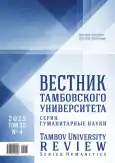The concepts of “scientific style of speech” and “specialty language” in the practice of teaching RFL: engineering and technical profile
- 作者: Tskhovrebov A.S.1
-
隶属关系:
- Saint-Petersburg State University
- 期: 卷 30, 编号 4 (2025)
- 页面: 874-883
- 栏目: THEORY AND METHODS OF TEACHING RUSSIAN AS A FOREIGN LANGUAGE
- URL: https://journal-vniispk.ru/1810-0201/article/view/328012
- DOI: https://doi.org/10.20310/1810-0201-2025-30-4-874-883
- ID: 328012
如何引用文章
全文:
详细
Importance. In the process of teaching Russian to students of engineering and technical specialties, the advanced stage of training (language proficiency level B2) plays a special role, during which students improve their existing educational and professional skills. The process of teaching Russian at an engineering and technical university is carried out mainly on the basis of the scientific style of speech, and speech skills are formed through educational and scientific texts in the language of the specialty. In methodological literature, the concepts of “scientific style of speech” and “language of the specialty” are often confused. This important problem is the subject of this study.Materials and Methods. The base for the experimental research is the Military Institute (engineering and technical) of the Military Academy of Logistics and Technical Support named after Army General A.V. Khruleva. The research material is based on a corpus of errors identified in the process of analyzing the speech of non-philology students. The key research method is the error analysis method.Results and Discussion. The result of the study is: a) a methodological substantiation of the issue of the relationship between the concepts of “scientific style of speech” and “language of specialty”, presentation in the author’s methodological interpretation; b) definition of the nomenclature of speech skills that a foreign student should master in Russian language classes at an advanced stage of training: the content of Russian language classes is determined by the specifics of students’ activities in classes on special disciplines. Teaching specific lexical and grammatical features of these sublanguages is an important task in Russian language lessons.Conclusion. The scientific style of speech should be considered as a generic concept in relation to the language of the specialty and defined as its special case. In our case, we are talking about the engineering and technical specialty, which is distinguished as a variety of the scientific style of speech and includes sublanguages of construction disciplines. The skills developed in classes on special disciplines should be integrated into classes on the language of the specialty. In this regard, the development of the following skills is important: a) reading and listening to scientific texts; b) conveying the content of the read and listened to text in oral and written form (creation of secondary scientific texts); c) creation of primary scientific texts.
作者简介
A. Tskhovrebov
Saint-Petersburg State University
编辑信件的主要联系方式.
Email: alanec1985@mail.ru
ORCID iD: 0000-0002-5199-1460
SPIN 代码: 9982-9258
Cand. Sci. (Education), Associate Professor of Russian as a Foreign Language and Methods of Teaching It Department
俄罗斯联邦, 7/9 Universitetskaya Emb., St. Petersburg, 199034, Russian Federation参考
-
Цховребов А.С. Эрратологическая модель обучения русскому языку иностранцев-нефилологов // Вестник Тамбовского университета. Серия: Гуманитарные науки. 2024. Т. 29. № 5. С. 1337-1352. https://doi.org/10.20310/1810-0201-2024-29-5-1337-1352, https://elibrary.ru/iezjcd Цховребов А.С. Эрратологический подход к обучению сложным предложениям в иностранной аудитории // Вестник Тамбовского университета. Серия: Гуманитарные науки. 2024. Т. 29. № 3. С. 708-723. https://doi.org/10.20310/1810-0201-2024-29-3-708-723, https://elibrary.ru/lujimu Митрофанова О.Д. Научный стиль речи: проблемы обучения. Москва, 1985. 128 с. https://elibrary.ru/sixqcm Петрова Г.М. Новый подход к тестовому экзамену по русскому языку для иностранных абитуриентов // Гуманитарный вестник. 2013. № 3 (5). С. 4-10. https://elibrary.ru/rennmp Пиневич Е.В. Аспекты и направления в преподавании русского языка как иностранного в нефилологическом вузе // Гуманитарный вестник. 2014. № 4 (18). С. 1-15. https://elibrary.ru/sngjan Кожина М.Н. О речевой системности научного стиля сравнительно с некоторыми другими. Пермь, 1972. 395 с. Денисов П.Н. Еще о некоторых аспектах изучения языков науки // Проблемы языка науки и техники: логические, лингвистические и историко-научные аспекты терминологии. Москва: Наука, 1970. С. 52-89. Будагов Р.А. Человек и его язык. Москва: Изд-во Моск. гос. ун-та, 1974. 262 с. Мотина Е.И. Язык и специальность: лингвометодические основы обучения русскому языку студентов-нефилологов. Москва: Рус. яз., 1983. 68 с. Кожина М.Н. О диалогичности письменной научной речи. Пермь, 1986. 91 с. Клобукова Л.П. Профессионально ориентированное обучение русскому языку инофонов: от текста к текстотеке и гипертексту // Педагогическое образование и наука. 2012. № 11. С. 10-12. https://elibrary.ru/qikjab Красильникова Е.В. Обучение научному стилю речи в практике преподавания русского языка как иностранного // Вестник Костромского государственного университета. 2017. Т. 23. № 1. С. 193-195. https://elibrary.ru/yrjeuf Досько С.И., Левина Г.М., Васильева Т.В. Из опыта организации учебного процесса для иностранцевпервокурсников в техническом вузе // Научный вестник Московского государственного технического университета гражданской авиации. 2006. № 102. С. 97-104. https://elibrary.ru/kphchx Авдеева И.Б. Обучение языку специальности иностранных учащихся инженерного профиля с учетом их когнитивных стилей // Alma Mater (Вестник высшей школы). 2015. № 7. С. 46-53. https://elibrary.ru/uaoiur Митрофанова О.Д. Язык научно-технической литературы. Москва, 1973. 147 с. https://elibrary.ru/tfudgb Бородулина М.К., Карлин А.Л., Лурье А.С., Минина М.Н. Обучение иностранному языку как специальности. Москва, 1982. 255 с. Еремина В.В., Еремина О.С. Место научного стиля речи в процессе обучения иностранцев русскому языку на довузовском этапе // Известия Волгоградского государственного технического университета. Серия: новые образовательные системы и технологии обучения в вузе. 2014. Т. 11. № 14 (141). С. 42-43. https://elibrary.ru/steqrp Хомякова Н.П. Обучение юристов иностранному языку специальности в бакалавриате и магистратуре: цели, принципы, содержание и средства обучения // Вестник Московского государственного лингвистического университета. Образование и педагогические науки. 2015. № 14 (725). С. 139-151. https://elibrary.ru/tyftar Балтабаева Э.О., Бекпентаева К.А., Байбурина К.А. Обучение студентов медицинских университетов научному стилю речи // Наука и здравоохранение. 2013. № 6. С. 37-39. https://elibrary.ru/xilpbb Евтюгина А.А., Гончаренко И.Г., Щетинина А.В., Стурикова М.В. Стилистика научной речи / под ред. А.А. Евтюгиной. Екатеринбург, 2021. 501 с. https://elibrary.ru/qrahxm Глухов Б.А., Щукин А.Н. Термины методики преподавания русского языка как иностранного. Москва: Рус. яз., 1993. 370 с. https://elibrary.ru/davism Клобукова Л.П. Обучение языку специальности. Москва, 1987. 77 с. Мисири Г.С. Использование наглядности на начальном этапе обучения русскому языку. Москва: Рус. яз., 1981. 144 с.
补充文件









